
"Maggie May" is a song co-written by singer Rod Stewart and Martin Quittenton, and performed by Rod Stewart on his album Every Picture Tells a Story, released in 1971.
The Barron Knights are a British humorous pop rock group, originally formed in 1959 in Leighton Buzzard, Bedfordshire, as the Knights of the Round Table.

"Baby Love" is a song by American music group the Supremes from their second studio album, Where Did Our Love Go. It was written and produced by Motown's main production team Holland–Dozier–Holland and was released on September 17, 1964.
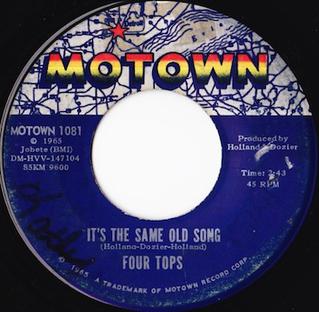
"It's the Same Old Song" was recorded by the Four Tops for the Motown label. It was released in 1965 as the second single from their second album. Written and produced by Motown's main production team Holland–Dozier–Holland, the song is today one of The Tops' signatures, and was reportedly created—from initial concept to commercial release—in 24 hours. It reached #5 on the Billboard Hot 100 and #2 on the Billboard R&B chart. It also reached #34 in the UK.

"I'm a Believer" is a song written by Neil Diamond and recorded by the Monkees in 1966 with the lead vocals by Micky Dolenz. The single, produced by Jeff Barry, hit the number-one spot on the U.S. Billboard Hot 100 chart for the week ending December 31, 1966, and remained there for seven weeks, becoming the last No. 1 hit of 1966 and the biggest-selling single for all of 1967. Billboard ranked the record as the No. 5 song for 1967. While originally published by Screen Gems-Columbia Music (BMI), it is now published by Stonebridge Music/EMI Foray Music (SESAC), with administration passed to Sony/ATV Music Publishing and Universal Music Publishing Group.

"I Wanna Be Your Man" is a Lennon–McCartney-penned song first recorded and released as a single by the Rolling Stones, and then recorded by the Beatles for their second studio album With the Beatles. The song was primarily written by Paul McCartney, and finished by Lennon and McCartney in the corner of a Richmond club while Mick Jagger and Keith Richards were talking.

"Father and Son" is a popular song written and performed by English singer-songwriter Cat Stevens on his 1970 album Tea for the Tillerman. The song frames a heartbreaking exchange between a father not understanding a son's desire to break away and shape a new life, and the son who cannot really explain himself but knows that it is time for him to seek his own destiny.

"Don't Let Me Be Misunderstood" is a song written by Bennie Benjamin, Horace Ott and Sol Marcus for American singer-songwriter and pianist Nina Simone, who recorded the first version in 1964. "Don't Let Me Be Misunderstood" has been covered by many artists. Two of the covers were transatlantic hits, the first in 1965 by the Animals, which was a blues rock version; and a 1977 by the disco group Santa Esmeralda, which was a four-on-the-floor rearrangement. A 1986 cover by new wave musician Elvis Costello found success in Britain and Ireland.
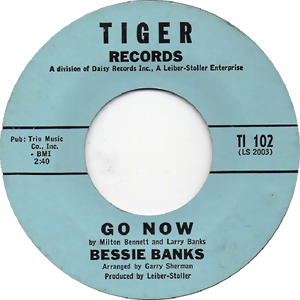
"Go Now" is a song composed by Larry Banks and Milton Bennett and first recorded by Bessie Banks, released as a single in January 1964. The best-known version was recorded by the Moody Blues and released the same year.
"Everybody Needs Somebody to Love" is a song written by Bert Berns, Solomon Burke, and Jerry Wexler, and originally recorded by Burke under the production of Berns at Atlantic Records in 1964. Burke's version charted in 1964, but missed the US top 40, peaking at number 58.
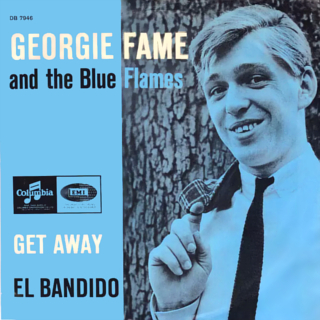
"Get Away" is a song by Georgie Fame and the Blue Flames, written by Georgie Fame. Initially written and recorded for an advertising campaign for petrol, the song was subsequently released on Columbia. It topped the UK Singles Chart for one week in July 1966.

"More Stars" a.k.a. "Stars on 45 Vol. 2" is a song issued in 1981 by the Dutch studio group Stars on 45, in the UK credited to 'Starsound'. It was the follow-up to the US and Dutch #1 and UK #2 single "Stars on 45". "More Stars" was later included on the band's second album Longplay Album - Volume II.
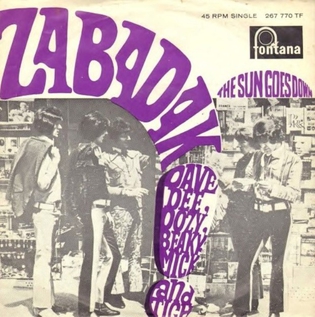
"Zabadak!" is a song by British musical group Dave Dee, Dozy, Beaky, Mick and Tich, written by Ken Howard and Alan Blaikley. It was released as a single in September 1967, peaking at number 3 on the UK Singles Chart and becoming the group's only single to chart on the Billboard Hot 100, peaking at number 52.
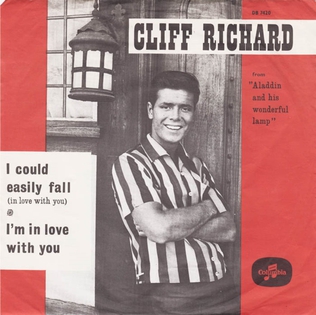
"I Could Easily Fall (In Love with You)" is a song by Cliff Richard and the Shadows, released as a single in November 1964 from their album Aladdin and His Wonderful Lamp. It peaked at number 6 on the UK Singles Chart and received a silver disc for 250,000 sales.
"I'll Come Running" is a song written by Neil Diamond. It was first released by Diamond in July 1966 as the B-side to his US top-ten single "Cherry, Cherry", before being included on his debut album The Feel of Neil Diamond, released in August 1966. The song was later covered by Cliff Richard and released as a single in June 1967; it peaked at number 26 in the UK Singles Chart.

"Geronimo" is an instrumental by British group the Shadows, released as a single in November 1963. It peaked at number 11 on the UK Singles Chart.

"Call Up the Groups" is a song by British humorous group the Barron Knights released as a single in July 1964. It became a top-three hit in the UK and was awarded a silver disc by Disc for sales of over 250,000 copies.
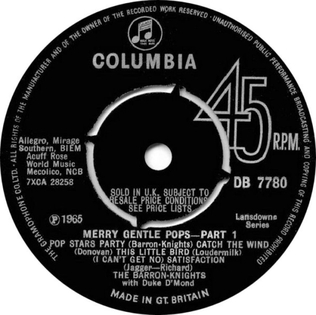
"Merry Gentle Pops" is a song by British humorous group the Barron Knights. It was released as a single in November 1965 and became a top-ten hit in the UK.

"I Wouldn't Trade You for the World" is a song by Irish pop group The Bachelors, released as a single in August 1964. It reached number-one in Ireland, became a top-ten hit in the UK and peaked in the top-100 in the US.

"A Taste of Aggro" is a song recorded by the Barron Knights in 1978. The song peaked at number three on the UK Singles Chart.

















